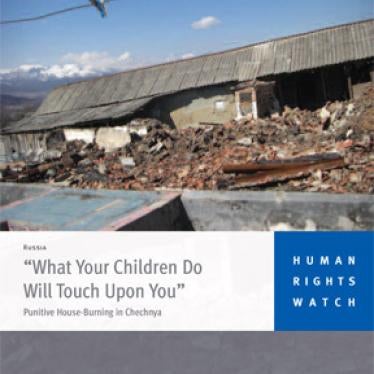(New York) - The Russian government should closely examine evidence gathered by the Austrian police relating to Chechnya's leader, Human Rights Watch said today. The evidence suggests that the Kremlin-appointed leader of Chechnya, Ramzan Kadyrov, was involved in the fatal attempted kidnapping in 2009 of a Chechen refugee in Vienna, Human Rights Watch said.
This evidence should form part of a broader investigation to include an examination of credible allegations of other serious human rights violations in Chechnya, Human Rights Watch said. The refugee, Umar Israilov, died as a result of gunshot wounds inflicted by his assailants during the bungled kidnapping attempt. The trial of three men charged with his attempted kidnapping and murder is to begin on November 16, 2010, in Vienna. According to the indictment, the three men tried to abduct Israilov to "deliver him to the authorities of Chechnya."
"The Vienna police and prosecution have linked this case to the Chechen authorities," said Rachel Denber, Europe and Central Asia director at Human Rights Watch. "So here is the question: What have the Russian authorities done to investigate any involvement in this case by the Chechen leadership - and more broadly, to find out who is responsible for the litany of serious human rights violations in Chechnya that have been documented by rights groups and journalists?"
Israilov, 27, was shot dead on January 13, 2009, as he left a grocery store in Vienna. In the years prior to his murder, he had stated publicly that he had been tortured by Kadyrov and had named Kadyrov in a case he had brought before the European Court of Human Rights.
The Austrian prosecutor's indictment states that one of Kadyrov's closest confidents, Shaa Turlaev, ordered the kidnapping and leaves open the question of whether Turlayev was the "driving force" behind the crime or "whether he only acted as Kadyrov's emissary and passed on orders."
The three accused kidnappers are in custody in Austria, but the whereabouts of the actual gunman are unknown. Kadyrov has denied any involvement in the crime.
An article in The New York Times immediately after the killing said that Israilov had been detained in 2003 in Chechnya as a rebel fighter, was freed under an amnesty, and then briefly served in Kadyrov's security services. The article cited an interview with Israilov in which he said that during his detention Kadyrov had tortured him, including using electric shocks. Israilov was also quoted as saying that he had witnessed beating, kicking, and other torture of detainees by Kadyrov and his subordinates.
The indictment says that, in the summer of 2008, Israilov was approached by a man who said he was sent by Kadyrov and who threatened harm to Israilov and his family if he did not withdraw a case about his torture that he had submitted to the European Court of Human Rights and return to Chechnya. Shortly thereafter the man, Artur Kurmakaev, told Viennese police that Kadyrov had "ordered him to find Israilov and to return him." Kurmakaev was eventually detained in Austria and deported - allegedly voluntarily - to Russia in June 2008. There has been no information about his fate or whereabouts since early 2009.
Several days prior to the killing, Israilov complained to Austrian police authorities that he was being followed by unknown individuals.
"The indictment says this is a political murder, and it seems very plausible that Israilov was targeted because he directly accused the Chechen leader of torture," Denber said. "Sadly, Israilov is only one of a number of persons who have been killed after they exposed abuses in Chechnya."
On July 15 2009, the most prominent Chechen human rights activist, Natalia Estemirova, was abducted in Chechnya and murdered. Estemirova worked on some of the most sensitive human rights cases for the Memorial Human Rights Center. The circumstances of her murder, along with a pattern of threats against her, Memorial, and independent activists and journalists in Chechnya, all point to possible official involvement or acquiescence in her murder.
In August 2008, another alleged victim of torture in Chechnya, Mokhmadsalakh Masaev, was abducted in Chechnya several weeks after the publication of an interview in which he described his ill-treatment and illegal detention in a secret prison allegedly run by Kadyrov in his home village. Masaev's fate and whereabouts are unknown.
For years, Memorial, Human Rights Watch, and other groups have documented human rights violations by pro-Kremlin Chechen forces under Kadyrov's de facto control, in the context of Chechnya's counter-insurgency campaign. Despite these repeated allegations and reports, the Russian government has taken no meaningful steps to investigate them.
"This trial turns a spotlight on what is happening in Chechnya." Denber said. "For years, Chechen law enforcement and security forces have abducted, secretly detained, tortured, forcibly disappeared, and even killed relatives of alleged insurgents or those suspected of any form of collaboration with the insurgency. While Israilov's abduction and torture ordeal happened in 2003, these abuses are going on in today's Chechnya."







